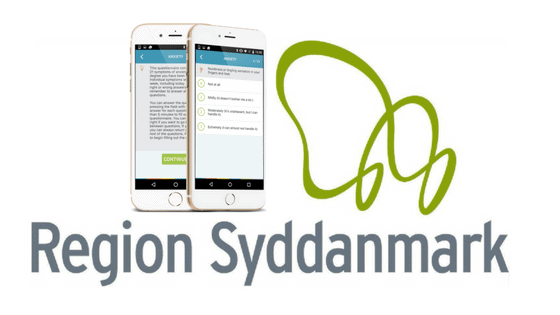For additional information, please contact:
Helen Chen
Marketing
Monsenso
+45 30 25 15 26
marketing@monsenso.com

Region South Denmark Clinics widely implement Monsenso mHealth solution
Region South Denmark Clinics will use the Monsenso mHealth solution to support treatment of individuals diagnosed with depression, anxiety, bipolar, schizophrenia, or borderline personality disorder.
Copenhagen, Denmark – 4, September, 2017
The Mental Health Services in the Region of Southern Denmark are currently rolling out the Monsenso mHealth solution to support the treatment of individuals with affective disorders.
Monsenso is an innovation leader in mobile health solutions for mental health. Their mHealth solution is presently used by 25 clinicians across Mental Health Services in the Region of Southern Denmark to support the treatment of individuals diagnosed with depression, anxiety, bipolar, schizophrenia or borderline personality disorder.
Thomas Lethenborg, CEO at Monsenso, said that the decision for the roll-out came as a natural progression of the collaboration between Monsenso and the Region of Southern Denmark Mental Health Services on the ENTER project and the Public-Private Innovation (PPI) Partnership.
“Monsenso and the Region South Denmark have been working on different research projects for quite some time now; it’s only natural they decide to roll out our mHealth solution widely. By implementing Monsenso Clinic, clinicians will have access to patients’ historical aggregated data which will assist them in making better decisions in regards to a person’s treatment,” Mr. Lethenborg added.
The Monsenso solution has been previously utilised during research trials at The Centre for Telepsychiatry in the Region of Southern Denmark.
Claus Faerch Head of Department at The Centre for Telepsychiatry in the Region of Southern Denmark said: “We are continuously looking to improve patient engagement, and this technology will help us to track and discover more changes in mood. Our aim is to use the technology to help support the treatment we currently provide to our patients, with views to expanding the programme to more clinicians shortly.”
The mHealth solution is based on a double-loop treatment model. The first loop consists of a smartphone app operates as a self-management tool to provide the patient insight into how their actions may influence their disorder. Individuals can use the app to fill out routine self-assessments regarding their behaviour, such as logging the amount of hours they have slept. Additionally, the app also collects sensor data and sends helpful notifications for when patients are reporting behaviour that may trigger symptoms of their disorder.
The second loop of the treatment model involves the clinician. Clinicians can access a web portal that is synchronised to the patient’s app. This synchronisation enables clinicians to efficiently access the data collected by the patients’ smartphones anytime and anywhere.
This comprehensive double loop feedback system aims to increase patient engagement, awareness, and informed decision making during treatment.
Click on this link to read this press release in Danish.

